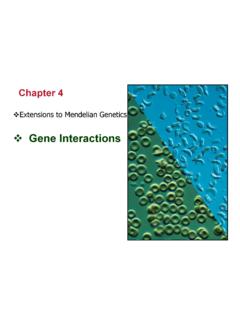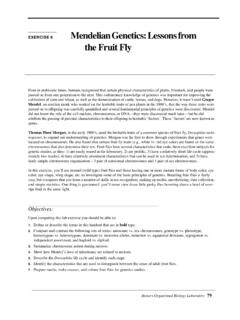Transcription of GENETICS AND PLANT BREEDING - Welcome to ICAR
1 Publication (A)/Pub- 13/3-2001. CURRICULA AND SYLLABI FOR. MASTER'S DEGREE PROGRAMS. GENETICS AND PLANT BREEDING . AND. SEED SCIENCE AND TECHNOLOGY. ACCREDITATION BOARD SECRETARIAT. EDUCATION DIVISION. INDIAN COUNCIL OF AGRICULTURAL RESEARCH, KRISHI ANUSANDHAN BHAVAN II, NEW DELHI-11Q O12. CURRICULA AND SYLLABI FOR. MASTER'S DEGREE PROGRAMS. GENETICS AND PLANT BREEDING . AND. SEED SCIENCE AND TECHNOLOGY. CURRICULA AND SYLLABI FOR. MASTER'S DEGREE PROGRAMS. GENETICS AND PLANT BREEDING . AND. SEED SCIENCE AND TECHNOLOGY. ACCREDITATION BOARD SECRETARIAT. EDUCATION DIVISION. INDIAN COUNCIL OF AGRICULTURAL RESEARCH, KRISHI ANUSANDHAN BHAVAN II, NEW DELHI-110 012.
2 Publication No. 1 CAR/Ed.(A) PRINTED : NOVEMBER 2001. DIRECTOR (DIPA) : ARVIND CHAKRAVARTY. CHIEF PRODUCTION OFFICER : V K BHARTI. TECHNICAL OFFICER : ASHOK SHASTRI. Published by Shri Arvind Chakravarty, Director, Directorate of Information and Publications of Agriculture, Krishi Anusandhan Bhavan, Pusa, New Delhi, Laser typeset at M/s. HD Computer Craft, EA-1/75, Inderpuri Main Market, New Delhi 110012 and Printed at M/s. Power Printers, 2/8A, Ansari Road, Delhi-110002. Preface The agricultural scenario in the post Green Revolution era has changed Indian agriculture from the subsistence farming to a commercial enter- prise.
3 Signing of World Trade agreement by India has exposed Indian farmers to the global competition. This demands rapid modernization of Indian agriculture so that our farm produce meets not only national but international quality standards, is produced at internationally competi- tive price and is sustainable. This, therefore calls for developing and imparting proper training to the farmers, which is possible only if the trainers which are produced by the agricultural universities are them- selves properly educated in the advances in science of agriculture par- ticularly at the post-graduate level where they have not only to learn the recent advances in their subject but have also to be trained in the mod- ern and latest techniques in their disciplines so that they can partici- pate and contribute in the development and advancement of agricul- tural science in India.
4 Keeping this in view, the ICAR which is vested with the responsibilities of guiding and coordinating agricultural education in the country, took several steps to ensure quality education to meet the ever changing na- tional and global scenario in agriculture and allied sciences. One of these steps was to set up an Accreditation Board, which among other things is required to periodically assess the curricula of various educa- tional programs offered by the National Agricultural Education System and suggest modifications. The second step in this connection was the constitution of Broad Sub- ject Matter Area (BSMA) Committees for modification of PG Curricula and related issues.
5 The BSMA Committee on PLANT Science was consti- tuted through ICAR Office Order No. l-3 Dated to revise PG Curricula in GENETICS and PLANT BREEDING , and Seed Science and Technology. The Committee comprised Dr S. Chandra Shetty, UAS, Bangalore; Dr Gautam, NBPGR, New Delhi; Dr Mishra, GBPUAT, Pantnagar; Dr Singh, BHU, Varnasi; Dr MMK. Durga Prasad of ANGRAU, Dr Singhal, IARI, New Delhi and Dr Dhillon, ICAR, New Delhi with Dr Sarkar, IARI, New Delhi as Coor- dinator. Though some of the members met informally and exchanged their views, formal meeting of the Committee could not be held. Therefore, Dr Singh, Head of Division, GENETICS , IARI, New Delhi and Dr Singhal, Professor, Seed Science and Technology, IARI, New Delhi were identified and requested to take lead in restructuring the PG curricula in respec- tive disciplines.
6 These identified Subject Matter Specialist took pains to compile the draft curricula based on the syllabi of leading institutions, both in India and abroad. The compiled curricula and course outlines were sent to different institution in India for their comments. The com- ments were analyzed and incorporated in the draft syllabi, which were discussed in separate workshops organized for the purpose and final- ized. The workshop on GENETICS and PLANT BREEDING was held at IARI, New Delhi on 27-28 April, 2001, which was attended by 39 Scientist (Appendix I). Similarly, the workshop on Seed Science and Technology was organized at NAARM, Hyderabad on 6-7 April, 2001, where 34 per- sons participated (Appendix-II).
7 The curricula and course outlines, which emerged from these workshops were placed before the Sectoral Committee of Accreditation Board on Curricula and Equivalence, which recommended the same to the Board for approval. The Board approved the curricula and course outlines in its 6th meeting held on 20th June,2001, which are brought out in this publication. The students of GENETICS and PLANT BREEDING are required to have in depth knowledge about classical and latest developments in the science of GENETICS , PLANT BREEDING and biotechnology. In modifying amd devel- oping post-graduate course in GENETICS and PLANT BREEDING , emphasis has been given to keep a balance among major components like basic GENETICS , cytogenetics, PLANT BREEDING , quantitative GENETICS , molecular biology and biotechnology.
8 The courses in GENETICS include principles of GENETICS , gene regulation and genetic control of PLANT reproduction. Like- wise, to cover the entire facets of cytogentics, the courses like principles of cytogenetics, crop cytogentics & genome analysis, and applied cytegentics were developed. Different courses have been designed in PLANT BREEDING to cover the basic principles, methodology for improvement of specific crops, stress resistance, quality improvement, mutagenesis, and population GENETICS . In genetic Engineering and Biotechnology section, emphasis has been given on basic principles of genetic engineering, de- velopment of transgenic crops and molecular BREEDING .
9 Due weightage has been given to practicals wherever it was felt necessary to provide opportunity to learn and do the exercises on topics covered in their classes. In the earlier curriculum of Seed Science & Technology, there were dif- ferent courses with similar titles and duplication of course contents in different courses. While restructuring postgraduate curriculum, these problems were overcome. Some of the courses of elementary nature were deleted and some advanced courses and emerging trends in seed quality enhancement containing new topics like pelleting, film coating, seed tape mats, seed priming, synthetic seed, embryo encapsulation etc were added.
10 New topics like IPR, PVP and molecular fingerprinting were also included in the curriculum. A new course on seed production in fruits and plan- tation crops, medicinal plants , and flowers was also added. To bridge the gap between theory and practical and to give the best training to students, the workshop suggested an innovative approach for practical training in the form of student attachment with some seed industry/related organization. If this is implemented, this will be first new approach in post-graduate education in agricultural sciences. We gratefully acknowledge the guidance and encouragement received from Dr Paroda, Secretary, (DARE) and DG, ICAR, and Chairman of Accrediation Board, in restructuring PG Curricula.









